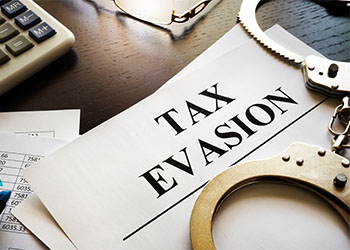What You Need to Know About Tax Evasion
July 26, 2024
 Tax regulations are not always straightforward, and it can be easy to overlook accounting errors or misunderstand essential details of tax codes. If you’re facing a tax audit in Nevada, it’s important to understand the definition of tax evasion, the potential penalties, and best practices for staying compliant. For business owners and taxpayers in Nevada, understanding tax evasion can help you avoid unintentional mistakes and protect your business and personal finances.
Tax regulations are not always straightforward, and it can be easy to overlook accounting errors or misunderstand essential details of tax codes. If you’re facing a tax audit in Nevada, it’s important to understand the definition of tax evasion, the potential penalties, and best practices for staying compliant. For business owners and taxpayers in Nevada, understanding tax evasion can help you avoid unintentional mistakes and protect your business and personal finances.
For those dealing with tax law matters in Nevada, the Law Office of Scott N. Tisevich is a valuable resource. Located in Reno, Nevada, and serving clients throughout Churchill County, Lyon County, Carson City, Story County, Douglas County, and Las Vegas, Scott N. Tisevich brings years of experience to offer comprehensive legal counsel tailored to the unique needs of each client.
Whether you're focused on tax preparation, navigating complex tax codes, facing an audit, or seeking advice on compliance, Scott N. Tisevich provides knowledge and support to help you manage your tax concerns.
This guide aims to educate small business owners and taxpayers in Nevada about what tax evasion entails, its implications, and how to protect themselves.
Understanding Tax Evasion and Its Implications
The first step when addressing concerns around tax evasion is to understand how it differs from tax fraud and tax avoidance. While both tax fraud and tax evasion involve dishonest reporting, the two terms are not interchangeable.
Tax fraud is broader and includes any intentional wrongdoing on a tax return, while tax evasion is specifically about illegally avoiding paying taxes.
Tax evasion is the illegal act of deliberately avoiding paying taxes owed to the government. This can involve underreporting income, inflating deductions or expenses, hiding money in offshore accounts, or other fraudulent activities. Tax evasion can lead to severe penalties, including hefty fines and potential jail time.
Tax avoidance, on the other hand, is the legal practice of finding ways to reduce your tax liability through methods allowed by law, such as claiming deductions and credits.
Individuals and business owners must be aware of these distinctions to steer clear of legal troubles.
Common Forms of Tax Evasion
Tax evasion can take several forms, each carrying significant legal consequences. Here are some of the most common methods used:
Underreporting Income
Failing to report all earned income is a typical form of tax evasion. This might include cash transactions that are not documented.
Overstating Deductions
Claiming deductions that you are not entitled to is another common tactic. For example, inflating business expenses or claiming personal expenses as business-related can lead to severe penalties.
Using Offshore Accounts
Some business owners might hide money in offshore accounts to evade taxes. While having an offshore account is not illegal, failing to report it is.
How Tax Evasion is Detected and Prosecuted
Tax evasion in Nevada can be detected through various methods, including:
IRS audits: Random or triggered by discrepancies in tax returns
Whistleblower tips: Reports from third parties
Data matching: Comparing information from different sources, such as banks and employers
After detection, the following steps usually take place:
Notification: The taxpayer is informed of the audit or investigation
Investigation: Further examination of financial records and interviews
Prosecution: If sufficient evidence is found, charges may be filed, leading to court proceedings
Potential Penalties for Tax Evasion
Penalties for tax evasion in Nevada can be severe and may include:
Fines: Up to $250,000 for individuals and $500,000 for corporations
Imprisonment: Up to five years for each count of tax evasion
Interest and penalties: Additional charges on unpaid taxes
Civil penalties: These can include a fraud penalty of up to 75% of the underpayment due to fraud
The Role of a Tax Evasion Attorney
Understanding the legal definition and implications of tax evasion can help you protect your business and personal finances. If you’re concerned about tax evasion or facing an audit, Scott N. Tisevich offers knowledgeable advice and representation for those trying to avoid or reconcile tax evasion issues in Reno, Nevada, and surrounding areas.
From addressing IRS disputes to long-term tax planning, legal guidance can help you or your business maintain compliance and avoid penalties.
Protecting Your Business and Personal Finances
Preventing tax evasion starts with understanding and implementing best practices. Here are some practical steps to safeguard your business:
Keep Accurate Records
Confirm that all income and expenses are documented correctly to avoid discrepancies during audits.
Hire a Professional Accountant
A certified accountant can help manage your finances and make sure your tax returns are accurate and lawful. They can also provide valuable advice on legitimate deductions and credits.
Stay Informed on Tax Laws
Tax laws are continually evolving. Keeping abreast of the latest changes can help you stay compliant and avoid unintentional tax evasion.
Strategies for Addressing Potential Tax Evasion
If you believe you may have committed tax evasion, the next steps you should take include:
Consulting a legal professional: Seek advice from a tax attorney or CPA.
Reviewing your tax returns: Identify any mistakes or discrepancies.
Considering voluntary disclosure: Contact the IRS or Nevada Department of Taxation to discuss options for rectifying the issue.
Taking prompt action can often mitigate the severity of penalties and legal consequences, and seeking skilled legal counsel can make a significant difference.
Engaging a local attorney like Scott N. Tisevich, who understands Nevada's tax laws, can provide invaluable assistance. His office serves clients in Reno, Churchill County, Lyon County, Carson City, Story County, Douglas County, and Las Vegas, Nevada.
Frequently Asked Questions About Tax Evasion in Nevada
What is the statute of limitations for tax evasion charges in Nevada?
The statute of limitations for tax evasion in Nevada is generally six years from the date the fraudulent return was filed or the date the tax was due, whichever is later. However, this period can be extended under certain circumstances, such as if the taxpayer is outside the United States for a continuous period.
Can tax evasion charges be reduced or avoided if the offender shows remorse or cooperates with the authorities?
In some cases, showing remorse and cooperating with authorities can lead to reduced charges or penalties. This might involve:
Voluntary disclosure: Coming forward before being contacted by the IRS
Negotiated settlements: Reaching an agreement to pay back taxes along with reduced penalties
Plea bargains: Agreeing to plead guilty in exchange for lesser penalties
A skilled tax law attorney can assist with appropriate strategies if you’re facing tax evasion charges. Seeking legal counsel immediately is your best course of action.
Are there any local tax regulations that Nevada business owners need to know about?
Nevada has specific tax laws that can impact small business owners differently than in other states. For example, Nevada does not have a state income tax, but there are other taxes like the Modified Business Tax (MBT) that businesses must pay.
Tax Evasion Attorney in Reno, Nevada
Tax evasion carries severe consequences that can jeopardize your business and personal finances. By staying informed and seeking professional legal advice, you can protect your interests and maintain compliance.
For business owners and taxpayers in Nevada looking to safeguard their operations, consulting with Scott N. Tisevich, is a wise step. His experience handling tax evasion cases can provide the support you need to manage complex tax issues.
Contact the Law Office of Scott N. Tisevich today to schedule a consultation and learn more about how to protect your business from the risks of tax evasion.
